Two Ukrainian flags on display in the church hall at St. Mary’s Assumption Ukrainian Catholic Church are a distinct reminder of the country’s ongoing fight to maintain independence.
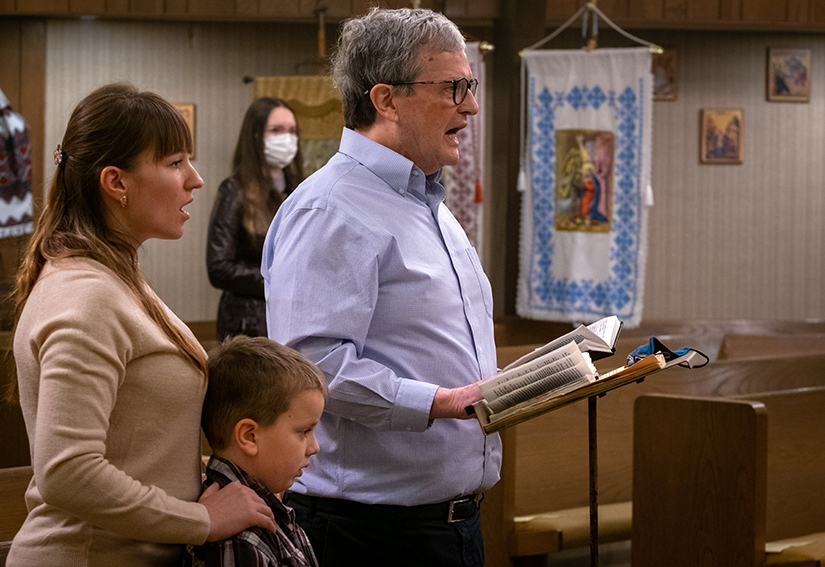 Cantor Maria Vitvitska, left, and her son David Vitvitskyi joined fellow cantor Tom Herman at Divine Liturgy at St. Mary’s Assumption Ukrainian Catholic Church in south St. Louis County Jan. 30.Photo Credits: Sid Hastings for the St. Louis ReviewThe flags are a gift from Ukrainian troops involved in the violent clashes that erupted in 2014 between Ukraine and Russia along Ukraine’s eastern border. Members of the church community in St. Louis, including Maria Vitvitska and her husband, Volodymyr Vitvitskyi, sent funding abroad to help the troops with necessities such as bottled water, protective equipment and support for rehabilitation centers for wounded soldiers. The flags were mailed to parishioners in gratitude for the support.
Cantor Maria Vitvitska, left, and her son David Vitvitskyi joined fellow cantor Tom Herman at Divine Liturgy at St. Mary’s Assumption Ukrainian Catholic Church in south St. Louis County Jan. 30.Photo Credits: Sid Hastings for the St. Louis ReviewThe flags are a gift from Ukrainian troops involved in the violent clashes that erupted in 2014 between Ukraine and Russia along Ukraine’s eastern border. Members of the church community in St. Louis, including Maria Vitvitska and her husband, Volodymyr Vitvitskyi, sent funding abroad to help the troops with necessities such as bottled water, protective equipment and support for rehabilitation centers for wounded soldiers. The flags were mailed to parishioners in gratitude for the support.
“It’s maybe not a lot, but what we can give,” Volodymyr Vitvitskyi said. “When everybody sends a little bit, it can make a big impact.”
Tensions have once again risen, with the threat of a large-scale Russian-Ukrainian conflict looming. In the spring of 2021, Russia was accused by several Western nations of trying to provoke more active fighting by holding military exercises near the border.
A buildup of more than 100,000 Russian troops just over the border created alarm in December. Last month, Britain’s Foreign and Commonwealth Office released a statement saying it had evidence that Russia was developing plans to install a pro-Russian government in Ukraine.
The current situation is an extension of the conflict that began in 2014, after Russia annexed Crimea and Russian-backed separatists attacked Ukrainian government forces in the eastern Ukrainian regions of Donetsk and Luhansk. About 1.5 million people have fled the region to other parts of Ukraine, and more than 14,000 civilians and soldiers have died, with many more injured.
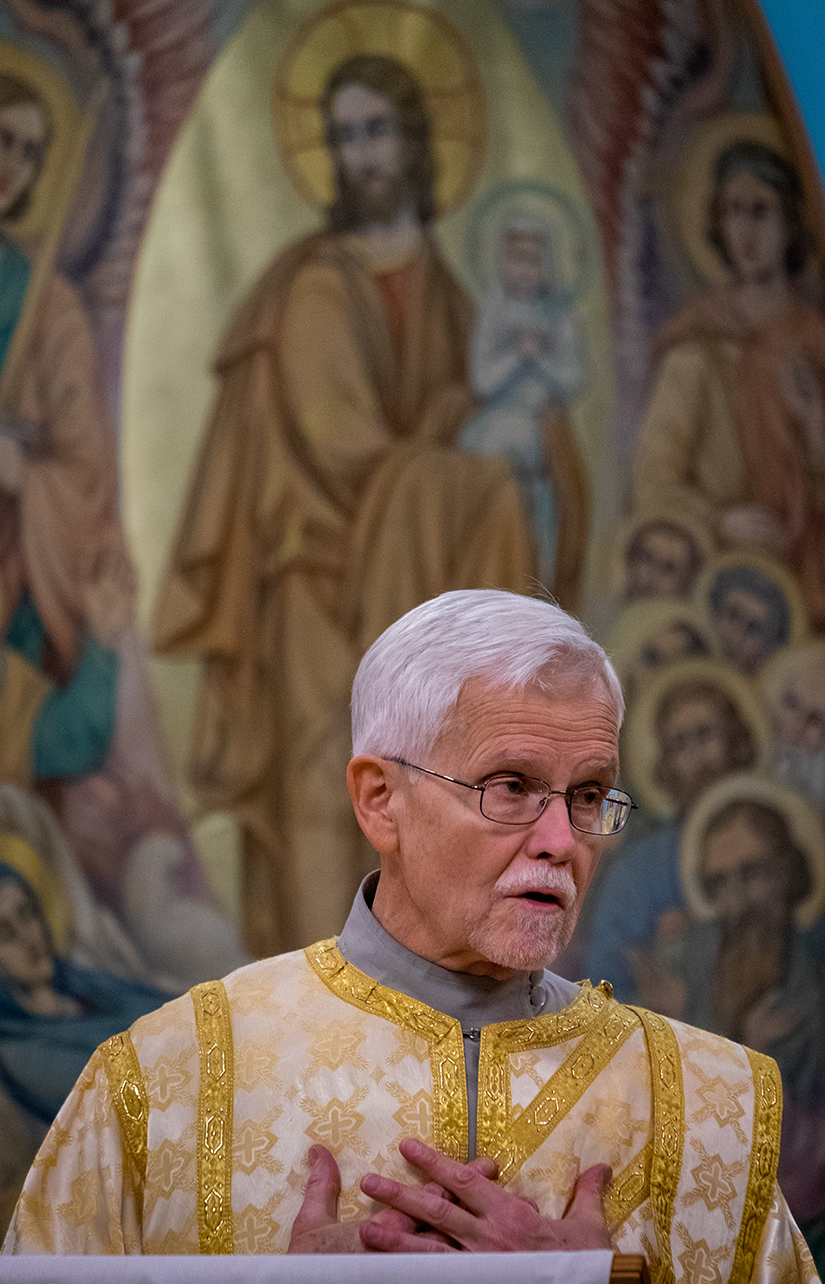 Deacon Eugene Logusch participated in Divine Liturgy at St. Mary’s Assumption Ukrainian Catholic Church Jan. 30. Deacon Logusch discussed the current crisis along the Ukrainian-Russian border, where the Russian army is massing troops and equipment.Photo Credits: Sid Hastings for the St. Louis ReviewMembers of the Ukrainian Catholic community in St. Louis said that the current tension is another example of history repeating itself. Many of the parish’s 50 households are fairly recent immigrants, with some arriving here after the downfall of the Soviet Union in 1991.
Deacon Eugene Logusch participated in Divine Liturgy at St. Mary’s Assumption Ukrainian Catholic Church Jan. 30. Deacon Logusch discussed the current crisis along the Ukrainian-Russian border, where the Russian army is massing troops and equipment.Photo Credits: Sid Hastings for the St. Louis ReviewMembers of the Ukrainian Catholic community in St. Louis said that the current tension is another example of history repeating itself. Many of the parish’s 50 households are fairly recent immigrants, with some arriving here after the downfall of the Soviet Union in 1991.
“The big picture is that this is nothing new; this has gone on for centuries,” said parish administrator Deacon Eugene Logusch, whose parents came from Ukraine to New York City, via Germany, in 1949. “Unfortunately, after the Soviet period, it’s taken this long — finally — for most people to wake up. Polls show a very high percentage of Ukrainians of all ages ready if called in some way to defend” their country, he added.
At a Divine Liturgy Jan. 30, St. Mary’s Assumption parishioners prayed for peace and strength in Ukraine. “Ukraine is worried these days, because something besides salvation may be coming,” said Jesuit Father James Deshotels, who provides for the sacramental needs of the parish. “We know that whatever happens, God is with us. As we say so many times during the Divine Liturgy, Christ is among us. And He will not abandon us.”
Hanna Dadyka, who came here with her father in 2011, said it is difficult to look at what is happening in her homeland. Her mother, Tetyana Dyuk, arrived in the U.S. first in 2006. Dadyka’s father previously served in the Ukrainian armed forces.
“He is very drawn to the situation that is occurring. A lot of his friends have passed away,” Dadyka said. “It’s difficult to even talk about it. Each year, it seems like it might be easing, but at the same time, it’s getting more and more tense.”
As her three children played in the church hall, Maria Vitvitska said she has high hopes that Ukraine will remain strong as it continues to assert itself as an independent nation. The faith community at St. Mary’s Assumption has helped their family to stay connected and spiritually support one another.
“If there’s a challenge, we need to pray — and God will help us,” she said. “We are like a big family here. When we arrived, we were introduced to this community, and we try to stay connected and help one another. We’re glad that we can all support Ukraine during these challenging times.”
The complexities of Ukraine’s long history make it a challenge for some Westerners to understand why the nation finds itself in this situation, Deacon Logusch said. “The Ukrainian people have said they refuse to have a foreign dictator tell them how to live,” he said.
People of faith know that they cannot control what history gives them, but they can control how they respond, he said.
“Mother Teresa of Calcutta once said that God does not want or expect us to be successful, but to be faithful,” he said. “We must leave the driving to Him. There is so little we have control over other than our faith and character.”
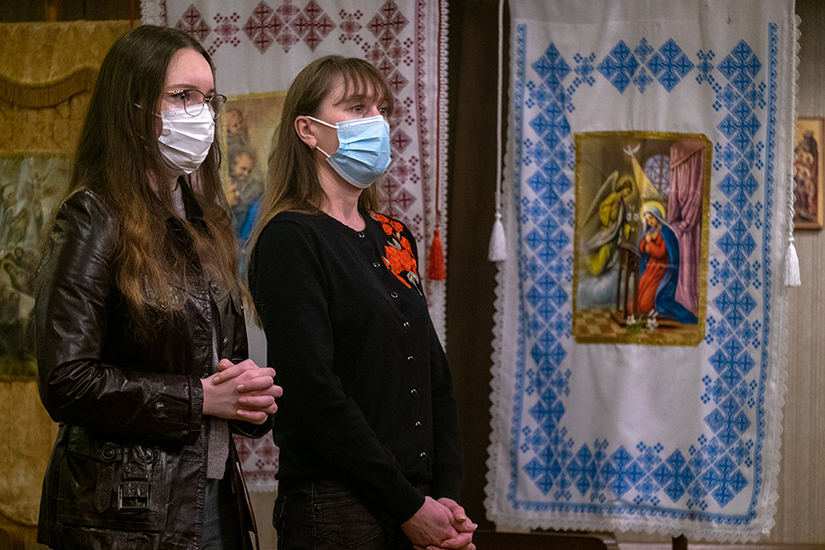 Parishioners Hanna Dadyka, left, and her mother, Tetyana Dyuk, participated in Divine Liturgy at St. Mary’s Assumption Ukrainian Catholic Church.Photo Credits: Sid Hastings for the St. Louis Review>> St. Mary’s Assumption Ukrainian Catholic Church
Parishioners Hanna Dadyka, left, and her mother, Tetyana Dyuk, participated in Divine Liturgy at St. Mary’s Assumption Ukrainian Catholic Church.Photo Credits: Sid Hastings for the St. Louis Review>> St. Mary’s Assumption Ukrainian Catholic Church
Western Ukrainian immigrants from Austria-Hungary began settling in the St. Louis area toward the end of the 19th century. In 1907, St. Mary’s Assumption Ukrainian Catholic Church, which follows the Byzantine liturgical rite, was founded to minster to Ukrainian and Ruthenian Catholics. They first began meeting in the basement at St. John Nepomuk Church, which served the Czech immigrant community at the time.
In 1910, St. Mary’s Assumption acquired a former Protestant church at 1120 Dolman Street near Lafayette Park in south St. Louis. The parish remained at that location for almost 75 years.
As many as 150 families belonged to the parish as late as the late 1950s. Many of the younger families started moving to the suburbs and began attending parishes closer to their homes. There also was post-war construction of Interstate 55 and nearby public housing projects, which contributed to a decline in the predominantly Slavic neighborhood. Those factors led the parish to move in 1985 to its current location at 11363 Oak Branch Drive, near Lindbergh Boulevard and Tesson Ferry Road, in south St. Louis County.
St. Mary’s Assumption is a part of the Chicago-based St. Nicholas Ukrainian Catholic Eparchy, which has more than 50 parishes, missions and monasteries throughout the Western United States. The eparchy falls under the Ukrainian Greek Catholic Church, the largest Eastern Rite Catholic Church in full communion with the Holy See. Major Archbishop Sviatoslav Shevchuk in Kyiv, Ukraine, serves as head of the Church.
Ukrainian Catholic archbishop asks people to pray, says Russian threat extends beyond Ukraine
Archbishop Shevchuk said dialogue and solidarity help overcome difficulties
By Catholic News Service
KYIV, Ukraine — The major archbishop of the Ukrainian Catholic Church reiterated concerns of some of his Baltic neighbors, saying that Ukraine might be on the front lines of a Russian threat, but the threat extends beyond Ukraine.
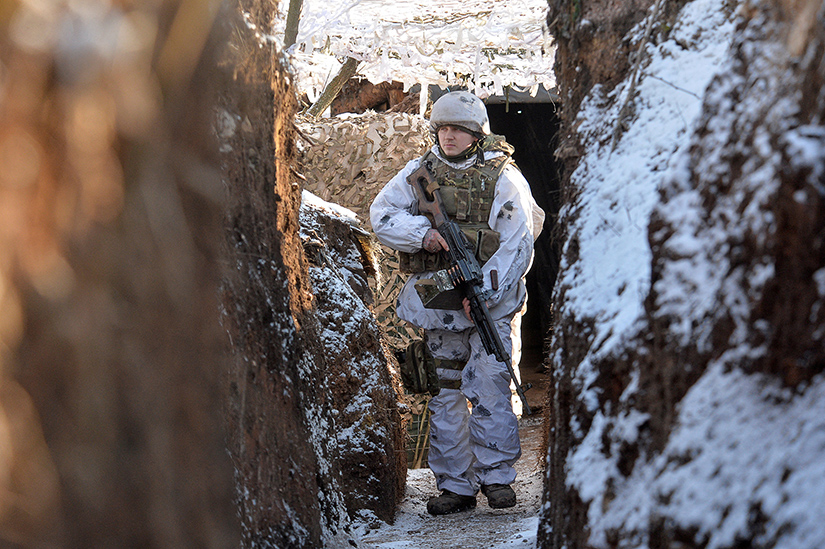 A service member of the Ukrainian armed forces walked in a trench at combat positions near the line of separation from Russian-backed rebels outside the settlement of Zaitseve in the Donetsk region of Ukraine Feb. 5. Ukrainian armed forces have been battling pro-Russian separatists in the region since 2014.Photo Credits: Oleksandr Klymenko | Reuters“The Ukrainian crisis is not only a crisis for Ukrainians,” said Archbishop Sviatoslav Shevchuk. “It’s something which is affecting the whole world — actually Europe, but also the United States and NATO members.”
A service member of the Ukrainian armed forces walked in a trench at combat positions near the line of separation from Russian-backed rebels outside the settlement of Zaitseve in the Donetsk region of Ukraine Feb. 5. Ukrainian armed forces have been battling pro-Russian separatists in the region since 2014.Photo Credits: Oleksandr Klymenko | Reuters“The Ukrainian crisis is not only a crisis for Ukrainians,” said Archbishop Sviatoslav Shevchuk. “It’s something which is affecting the whole world — actually Europe, but also the United States and NATO members.”
In a separate news conference, the archbishop also spoke about a possible papal visit to Ukraine.
In a Feb. 4 virtual news conference sponsored by the pontifical aid agency Aid to the Church in Need, Archbishop Shevchuk said there were four dimensions to the threat of what he called a “hybrid war” — military, propaganda, political and economic.
He also said a recent poll showed 63% of those surveyed considered “church” — religious organizations — the most reliable social structure in Ukrainian society. He said people are looking to churches for help figuring out how to respond to events and develop society, and church communities were trying to work together in response.
The first response is prayer, he said. Every day at 8 p.m. (noon Central time), Ukrainian Catholics are asked to stop what they are doing and pray the Rosary for peace in Ukraine, and he asked others to join them.
“When we pray, we are not afraid anymore,” he said. “We can calm down, and we can think, and we can examine our own consciences” and project logical responses to the crisis.
The second response is social service, and the bishops have decided to focus on those who are cold, “help the neighbor to survive.” He said the Church must offer hope.
“We believe that God is with us,” he said. “We do have hope. We do have the resources to withstand,” he said, without elaborating. When everyone is tempted “to save their own skin,” the Church hopes to help others.
Archbishop Shevchuk said there is a new “idolatry of violence” around the world, but Christians must say “No to violence. No to war.”
“Dialogue and solidarity can help us overcome any kind of difficulty,” he said.
Speaking to another group of journalists in a virtual news conference Feb. 8, Archbishop Shevchuk also spoke of the possibility of a visit by Pope Francis to Ukraine.
Grateful for the pope’s prayers and support, he said, Ukrainians obviously would not mind if Pope Francis explicitly recognized Ukraine as the “innocent victim of unjust aggression” on the part of Russia, 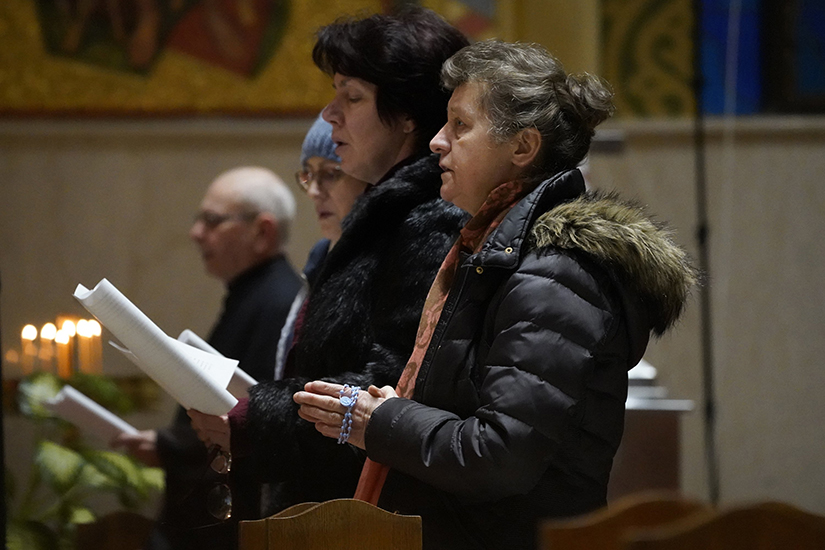 Parishioners prayed at an evening prayer service at St. George Ukrainian Catholic Church in New York City Jan. 26. The service was held in observance of the day of prayer for peace in Ukraine proclaimed by Pope Francis. St. George is the spiritual home to a large number of Ukrainian immigrants.Photo Credits: Gregory A. Shemitz | Long Island Catholic“but if the Holy See used this phrase it would shatter any possibility of being a mediator in the future between the sides. So, the style of Vatican diplomacy is not to take a side” in a conflict, but rather “to be above the conflict precisely to have the freedom to mediate and reconcile the opposing sides.”
Parishioners prayed at an evening prayer service at St. George Ukrainian Catholic Church in New York City Jan. 26. The service was held in observance of the day of prayer for peace in Ukraine proclaimed by Pope Francis. St. George is the spiritual home to a large number of Ukrainian immigrants.Photo Credits: Gregory A. Shemitz | Long Island Catholic“but if the Holy See used this phrase it would shatter any possibility of being a mediator in the future between the sides. So, the style of Vatican diplomacy is not to take a side” in a conflict, but rather “to be above the conflict precisely to have the freedom to mediate and reconcile the opposing sides.”
The pope is following the situation closely and “is very worried,” the archbishop said. “On several occasions we have expressed our desire for the pope to visit Ukraine,” and he has said he would like to, Archbishop Shevchuk added. “We’re hopeful.”
“We don’t want to wait 10 years,” the archbishop said.
The archbishop said he has told the pope that there is a “common feeling among Ukrainians — not just Catholics, but Orthodox, Protestants and nonbelievers — that Pope Francis is the greatest moral authority in the world, according to a sociological study. Among all religious leaders, including Patriarch Kirill (of Moscow, head of the Russian Orthodox Church) and other Orthodox patriarchs, in a country with an Orthodox majority, the greatest moral authority is Pope Francis, and the people say, ‘If the pope would come to Ukraine, the war would end.’”
“We do not think the pope is a miracle worker,” he said. “But from a religious point of view, it would be important. The visit of a pope is different from the visit of a president, it attracts the spiritual attention of the universal Church, it’s a spiritual event and would be important for confirming all of us in Ukraine in the faith. We need that.”
The archbishop’s remarks came amid an escalation of tensions and rhetoric over the buildup of Russian military forces near the border of Ukraine and in Belarus, near the Ukrainian border.
On Feb. 7, French President Emmanuel Macron traveled to Russia and Ukraine to try to de-escalate tensions, and German Chancellor Olaf Scholz traveled to Washington to coordinate policies on Ukraine.
Russia has denied any plans to attack Ukraine but wants Ukraine and other former Soviet republics to be barred from joining NATO.
During the virtual news conference at which Archbishop Shevchuk spoke, Archbishop Visvaldas Kulbokas, apostolic nuncio to Ukraine, thanked Pope Francis for the Jan. 26 day of prayer for peace in Ukraine and noted that the pope asked all people of goodwill, not just Catholics, to pray.
Speaking of the escalation of military and political tension in the region, Archbishop Kulbokas said, “If we leave the situation into the hands of politicians, sometimes it is even difficult to expect something positive, because everybody, every government must present its own interests.”
“The real Christian never, never engages in war … should not promote the war.”
“We are not pacifists in the sense that we do not participate in defending our county — no — but we don’t promote the war,” he added.